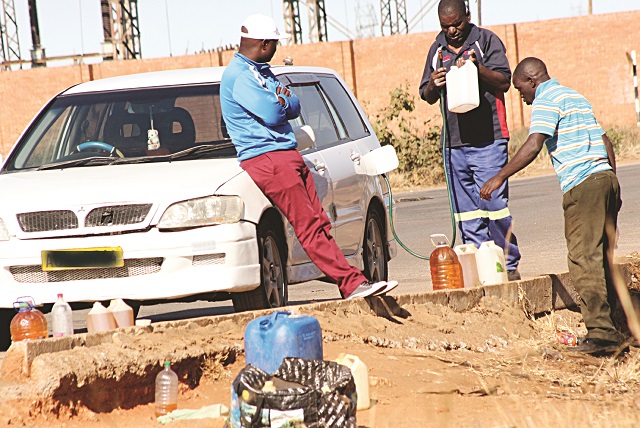Illegal fuel dealers flood Zimbabwe
By Blessings Mashaya
With two 20-litre jerry cans filled with petrol, Musa ducks traffic along Samora Machel Avenue, one of the biggest roads in Harare’s central business district.

He gets into his battered truck and zig-zags his way to somewhere before he re-merges a few minutes later with nothing in his containers.
Musa is one of the fuel dealers who are making a killing from buying diesel and petrol at controlled pump prices and offloading the product at huge margins on the black market.
As the fuel supplies dwindle due to a shortage of foreign currency, the black-market is recording soaring trade, with “smart dealers” making a killing from the desperate situation that has seen some people having to sleep in long, winding queues.
“We have to earn a living, there is nothing else for us to do,” Musa, aged 27 years, said.
According to the International Monetary Fund (IMF), Zimbabwe has one of the biggest informal markets and the job descriptions vary from the legal to the illegal.
Hoarding fuel for resell is just one enterprise gaining notoriety.
A Daily News team which went around Harare to assess the fuel situation was met with a plethora of fuel dealers who are now selling the scarce resource to people in queues.
“We are selling five litres for $20 dollars. We are happy because this situation has given us something to do,” an illegal dealer who identified himself as Takunda said.
If you can drive a hard bargain, you can get five litres for $15.
Interestingly, most of the fuel dealers used to be illegal foreign currency traders.
“As you know, you will be jailed for 10 years if you are found trading in foreign currency. As a result, we now feel safe dealing in fuel. I think this is much better,” a middle-aged man who identified himself as Baba T said.
According to the illegal dealers, they give fuel attendances money to get the much-needed liquid.
The Daily News witnessed desperate and frustrated motorists in serpentine queues at garages — similar to those witnessed during the horror 2008 hyper-inflationary era.
This comes as under-fire authorities announced two weeks ago that they had released an emergency $60 million for the procurement of fuel, as product shortages continue to cripple commerce and industry, agriculture, transporters and private motorists.
In addition, commuters have been left stranded and angry across the country, as they increasingly spend an inordinate amount of time waiting for transport — with those who are lucky to get lifts having to put up with sharply hiked fares.
On average, Zimbabwe uses about four million litres of fuel a day, amid claims by the government that the commodity shortages are due to cheap local product prices and an allegedly expanding economy.
Fuel operators have largely attributed the obtaining intermittent fuel crisis to the shortage of foreign currency, as the country is grappling with serious liquidity constraints.
Owing to the increase in demand for fuel on the market, the Reserve Bank of Zimbabwe (RBZ), which previously allocated $20 million for fuel, has increased the weekly allocation for the procurement of the commodity to $35 million per week.
Retailers buy their products outside the country through the RBZ which pays directly to the suppliers. Daily News






